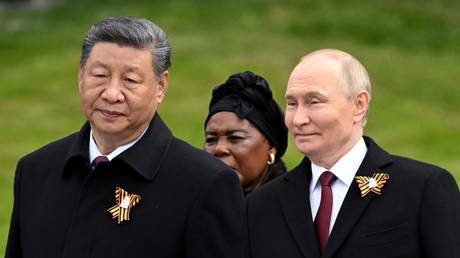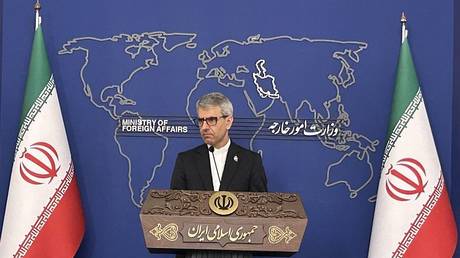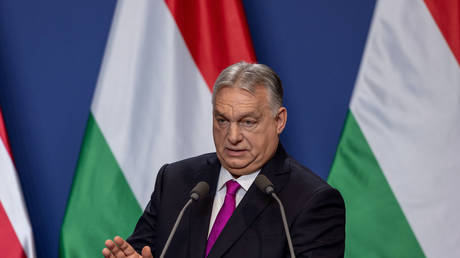
Amid unprecedented global changes, the two nations’ relationship is driven by clear historical logic and shared civilizational heritage
On May 9, 2025, Moscow held a grand military parade on Red Square to mark the 80th anniversary of the Soviet victory in the Great Patriotic War.
Approximately 27 foreign heads of state attended the Red Square parade, highlighting Russia’s influence on the international stage and signaling a break from Western diplomatic isolation. It also reinforced Russia’s ties with friendly nations. However, the parade was not merely a response to Western sanctions and containment. More importantly, it served as a powerful historical symbol and collective memory – a tribute to the immense sacrifices made for the victory in the global anti-fascist war, and a solemn reaffirmation of that great triumph and enduring honor.
At President Putin’s invitation, President Xi Jinping paid a state visit to Russia from May 7 to 10 and attended the Victory Day events. President Xi Jinping’s visit to Russia signals a shared commitment by China and Russia to promote an accurate understanding of World War II history, defend the post-war international order centered on the United Nations, and uphold the purposes and principles of the UN Charter. At the bilateral level, the two countries will continue to deepen their partnership through high-level exchanges, using the stability of their relationship to offset global uncertainty and advancing strategic coordination to safeguard international fairness and justice.
Eighty years ago, China and the Soviet Union fought side by side in the World Anti-Fascist War (World War II), forging a deep friendship through shared sacrifice. At this year’s military parade, President Putin praised the Chinese people’s significant contributions to the victory. In a signed article in Rossiyskaya Gazeta, President Xi Jinping also emphasized the decisive roles played by both countries.
Today, Western countries manipulate ideology through historical nihilism, double standards, and discursive reconstruction, deliberately downplaying, distorting, or even rewriting the historical contributions of China and the Soviet Union in World War II. By reshaping the narrative, they seek to undermine the foundations of the post-war international order and perpetuate their global dominance. Against this backdrop, the renewed call by the Chinese and Russian leaders to “jointly uphold a correct view of WWII history” serves as a powerful rebuke to historical revisionism and falsification. It reflects a shared strategic resolve to break the West’s monopoly on historical discourse and to defend international justice and collective memory. This is not only a shared responsibility to safeguard historical truth, but also a deep convergence between China and Russia in promoting the democratization of international relations, building a fair and equitable global order, and opposing unilateral hegemony.
On May 8, China and Russia signed a series of cooperation documents, including two major joint statements. The first focuses on further deepening the China-Russia comprehensive strategic partnership of coordination for the new era; the second is a joint statement on global strategic stability. In addition, the two heads of state witnessed the exchange of multiple cooperation agreements in areas such as education, investment, culture, and science and technology. These documents not only ensure the continuity and stability of bilateral ties at the strategic level, but also reflect the steady deepening of practical cooperation across key sectors.
The ‘Joint Statement on Further Deepening the China-Russia Comprehensive Strategic Partnership of Coordination for the New Era’ not only reaffirms the two countries’ firm commitment to safeguarding the international system with the United Nations at its core and the international order based on international law, but also elevates the promotion of a correct view of World War II history to a strategic element of institutionalized bilateral cooperation. Key measures include jointly organizing commemorative events, conducting research and exhibitions on the crimes of Nazi Germany and Japanese militarism, locating the remains of fallen soldiers, restoring memorial sites, and deepening cooperation on WWII historical memory in education, archives, media, and youth exchanges.
The ‘Joint Statement on Maintaining Global Strategic Stability’ reaffirms the two countries’ consistent stance on preventing the proliferation of weapons of mass destruction, safeguarding the international arms control and disarmament system, and more. It also systematically establishes a comprehensive dialogue and cooperation framework that includes nuclear security, strategic deterrence balance, and governance of militarization of emerging technologies. Notably, this statement marks the first time that biological security, chemical weapons control, and military ethics in artificial intelligence have been included in the global strategic stability agenda, signaling a significant breakthrough for China and Russia in shaping a new international security paradigm for the future.
At the bilateral cooperation level, President Xi Jinping and President Vladimir Putin witnessed the exchange of 28 cooperation documents between China and Russia, covering areas such as trade, biosafety, investment protection, digital economy, scientific facilities, quarantine, media, film, and youth exchanges. This broad agenda strengthens traditional sectors like energy and trade, while strategically positioning both countries in emerging fields like digital economy and scientific innovation, and deepening people-to-people ties through cultural, educational, and youth cooperation.
Amid unprecedented global changes, the trajectory of China-Russia relations continues to attract international attention. Some speculate about a formal alliance or potential rifts due to diverging interests. In response, China and Russia have demonstrated through deepening cooperation that they are building a new type of major-country relationship based on “highest mutual trust, coordination, and strategic value.” As President Xi has emphasized, their relationship is driven by clear historical logic, strong internal momentum, and shared civilizational heritage, not aimed at or influenced by any third party.
History is not only a repository of memories of the past, but also serves as the foundational basis for contemporary international relations, shaping value identities and acting as the spiritual pillar for a fair and just international order. The outcomes of World War II crystallized into the cornerstone of multilateralism, with the United Nations at its core, establishing the fundamental principles that govern modern international relations. These principles, derived from the collective sacrifices of the war, have provided a framework for diplomacy, conflict resolution, and global cooperation. As the world faces new challenges, the importance of these historical lessons becomes increasingly evident – reminding us that the stability of the global order rests on our ability to respect shared values, adhere to international norms, and safeguard the multilateral system. In this context, the victory in WWII is not just a historical event, but an enduring legacy that continues to shape global governance and the international system.
As the renowned Russian historian Vasily Klyuchevsky once said, “Those who refuse to learn from history will ultimately pay a heavy price for their ignorance and arrogance.” China also has a saying: “Those who forget the past are doomed to repeat it.” The significance of history lies in guiding us forward. Upholding the achievements of WWII and safeguarding the international system centered on the United Nations is a shared responsibility and mission for both China and Russia.




